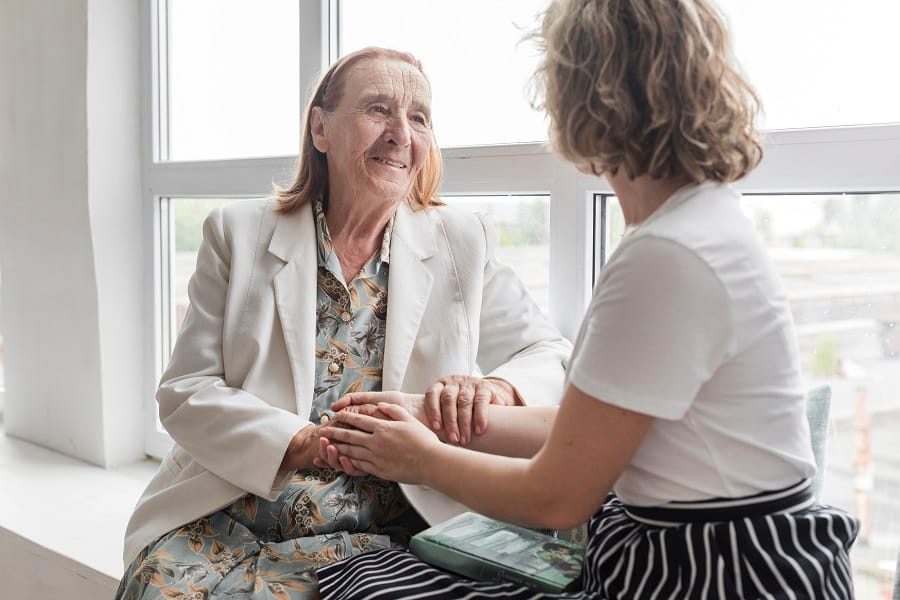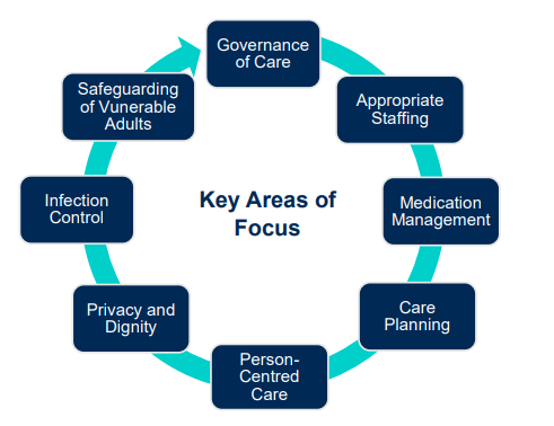Good Governance for Assuring Quality of Care in Missionaries and Religious Orders

Introduction
With an increasing average age of many congregations, caring for older members of Missionaries and Religious Orders is an increasing priority. Today this care is provided in many ways, from members themselves, directly employed staff, to external support companies.
The provision of any health and social care poses many challenges, but care to the elderly is particularly complex due to the wide variety of risks. Consequently, there is a requirement for an effective Governance Model to support the implementation of a safe, quality service.
In this blog, we discuss some of the risks to caring for the elderly and provide guidance on what a Good Governance model looks like.
Complex Care for the Elderly
As complex care is required when caring for the elderly, there are a significant number of risks related to the provision of the care, such as:
- Increasing healthcare needs that relate to elderly members.
- Various medical diagnosis that need to be managed on a day-to-day basis.
- Additional demands for caring for older members with dementia.
- Vulnerabilities, e.g., COVID-19.
- Management of medication variations.
- Providing individualised care in a standardised environment.
There are also significant organisational risks to be cognisant off, these include:
- Oversight of the service being provided – you must be able to identify if you are providing safe quality of care, know where the issues are, and what issues may possibly be coming down the line.
- Monitoring of subcontractors – significant elements of the service may be outsourced to sub-contractors or critical suppliers. Although you may be outsourcing activities to subcontractors, you still retain overall responsibility and a duty of care in relation to the quality and safety of the service being provided.
- Increased training requirements to ensure staff have the required skills to be able to deal with the variations as they are required.
Based on these risks, and others, it is mandatory to have an effective Governance model to support the implementation of a safe, quality service.
What does a Good Governance model look like?
The Governance model provides a framework and structure for the organisation to ensure the quality and safety of the care provided. Elements of a Good Governance model include, but are not limited to:
- The governance arrangements are appropriate for the size, scope and complexity of the service provided.
- Clearly defined lines of authority and accountability, with role delegation in place.
- Managed by people who have been appropriately trained and have the required experience.
- Management roles are visible at all levels, and members report that they know them.
- Provides adequate resources to assure the quality and safety of support.
- An effective risk management model to manage service and individual risks both proactively and reactively.
- Appropriate controls in place for critical subcontractors / suppliers.
- An open culture of communication between staff and management.
- Members’ involvement is supported to design and improve the service provision.
- The service provided is reflective of evidence based best practice and is person centred.
- Quality and safety Key Performance Indicator’s (KPI’s) are monitored and formally reported to management so that they can drive continuous quality improvement.
- Robust continuous assessment, including an effective audit programme implemented to drive quality improvement strategy. Supported through benchmarking of current status and identification of required improvements.
- A Culture of Learning is embraced – learning from incidents, feedback, external issues – to improve the quality and safety of care and support provided.
It is crucial for Missionaries and Religious Orders to reflect on their service and understand if the Governance Framework in place is sufficiently robust to ensure the quality and safety of the service provided to older members. It is also important that this Governance framework will identify the high-risk areas within the service and respond appropriately to these risks. However, undertaking an objective review this can be a challenge, this is where HCI can help.
Quality of Care (QualCareTM) Assurance For Missionaries and Religious Orders
Quality of Care (QualCareTM) Assurance for Missionaries and Religious Orders is a programme to independently evaluate the care and service provided for older members in residential care and assisted living. As most of the care provided to older members of Missionaries and Religious orders is currently unregulated by HIQA, there is a need to provide assurance that the members are receiving the care they deserve.
As part of QualCareTM, HCI will undertake a thorough review of the care provided, in line with best practice. This comprehensive care review will provide a clear understanding of where your organisation stands in terms of providing safe, quality care, for older members in residential care and assisted living. The programme shall commence with a comprehensive base line review of all services / residencies. This shall then be supplemented by focused visits on an annual basis.
The key areas of focus include:

Following a comprehensive review of care, in line with best practice, HCI will provide each organisation with an Assurance of Care Report, identifying the current structure, process and outcome controls in place, and a risk rated roadmap to improve to the necessary levels of best practice. Where necessary HCI shall provide support to makes the necessary changes.
Conclusion
The provision of any form of health and social care is challenging due to the level of complexity involved with the service provision, but with the average age of many congregations increasing, assuring the quality and safety of the care provided to older members of Missionaries and Religious Orders is a priority. A comprehensive, robust governance framework is central to the provision of an effective service to ensure that service provides person centred care and strive to drive continuous improvement.
HCI has been working with health and social care organisations for almost two decades, supporting them make intelligence driven decisions to attain, manage and improve quality, safety and regulatory compliance. We are expertly placed to support Missionaries and Religious Orders in objectively and independently reviewing their service against best practice requirements. Our support programme QualCareTM, will provide ongoing independent reassurance of the care provided and ensure that the correct structures and processes are implemented so that your elderly members receive safe, effective care.
For more information on QualCareTM contact HCI at 01 629 2559 or info@hci.care.